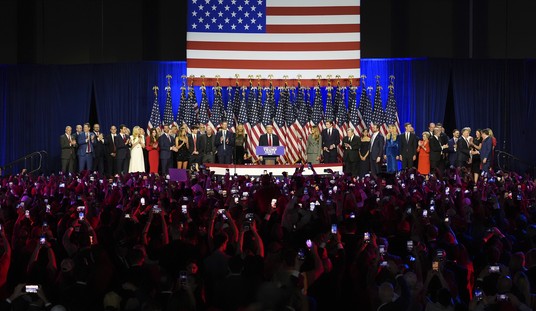Anti-American leftists like to pretend that the 14th Amendment grants citizenship to every new babe delivered on U.S. soil, regardless of the legal status of the parents. "It's birthright citizenship! It's in the Constitution!" they bray. Conveniently, they gloss over that stubborn little phrase — and subject to the jurisdiction thereof — that separates All persons born or naturalized in the United States and are citizens of the United States and of the State wherein they reside.
For reference, the full text of the first sentence of the first section of the 14th Amendment is:
All persons born or naturalized in the United States, and subject to the jurisdiction thereof, are citizens of the United States and of the State wherein they reside.
Clearly, the phrase and subject to the jurisdiction thereof was included for a reason. Like so many foundational phrases, it can seem inscrutable and open to multiple interpretations. Accordingly, the open-borders crowd has ascribed a facile meaning: Simply by being present on U.S. soil, they say, one is required to obey our laws and is therefore subject to our jurisdiction. But if this were the case, there would have been no reason to include the phrase in the first place.
Luckily, the U.S. Supreme Court has already clarified the phrase's meaning, declaring in no uncertain terms that it does not grant citizenship to anchor babies, birth-tourism newborns, or progeny of foreign nationals. After all, it is indeed possible to be on U.S. soil and not subject to our jurisdiction.
In 1865, the U.S. Civil War ended. Three years later, in 1868, the 14th Amendment was ratified. The most glancing awareness of the history surrounding its adoption reveals that it was intended to ensure citizenship for newly freed slaves and their progeny. It was not drafted to extend citizenship to the child of anyone and everyone who simply happened to exist within our borders when labor came on.
How do we know this to be the case? Because the U.S. Supreme Court said so.
A mere four years after the amendment became law, and while the debate surrounding its adoption (and the Civil War itself) was fresh in America’s mind, SCOTUS did indeed clarify the meaning of the troublesome (for unchecked immigration fans) phrase.
In the 1872 Slaughterhouse Cases, which ultimately decided that “The Privileges or Immunities Clause of the Fourteenth Amendment is limited to federal citizenship rather than extending to state citizenship,” SCOTUS justices clarified the 14th Amendment in several places.
First, they reaffirmed that the amendment was intended for the benefit of freed slaves:
An examination of the history of the causes which led to the adoption of [the 13th and 14th] amendments and of the amendments themselves demonstrates that the main purpose of all the three last amendments was the freedom of the African race, the security and perpetuation of that freedom, and their protection from the oppressions of the white men who had formerly held them in slavery.
The justices went on to fully clarify the phrase and subject to the jurisdiction thereof:
That its main purpose was to establish the citizenship of the negro can admit of no doubt. The phrase, "subject to its jurisdiction" was intended to exclude from its operation children of ministers, consuls, and citizens or subjects of foreign States born within the United States.
I mean, that's pretty clear.
In case there was still any doubt, 12 years after that, in the 1884 case Elk v. Wilkins, the Supreme Court went on to deny citizenship to an American Indian because he was born into a tribe that was considered an independent nation at that time:
An Indian, born a member of one of the Indian tribes within the United States, which still exists and is recognized as a tribe by the government of the United States, who has voluntarily separated himself from his tribe, and taken up his residence among the white citizens of a state, but who has not been naturalized, or taxed, or recognized as a citizen either by the United States or by the state, is not a citizen of the United States within the meaning of the first section of the Fourteenth Article of Amendment of the Constitution.
A petition alleging that the plaintiff is an Indian, and was born within the United States, and has severed his tribal relation to the Indian tribes, and fully and completely surrendered himself to the jurisdiction of the United States, and still so continues subject to the jurisdiction of the United States, and is a bona fide resident of the Nebraska and City of Omaha, does not show that he is a citizen of the United States under the Fourteenth Article of Amendment of the Constitution.
"American Indians and their children did not become citizens until Congress passed the Indian Citizenship Act of 1924," wrote Hans A. von Spakovsky in his excellent essay "Birthright Citizenship: A Fundamental Misunderstanding of the 14th Amendment."
"There would have been no need to pass such legislation if the 14th Amendment extended citizenship to every person born in America, no matter what the circumstances of their birth, and no matter who their parents are," he notes.
To date, Congress has passed no such bill, nor has any president signed one that extends U.S. citizenship to babies born on U.S. soil to illegal immigrant or birth-tourist parents. The only major legal or legislative adjustment in all that time has been the 1898 case, United States v. Wong Kim Ark, in which SCOTUS ruled that the native-born son of Chinese immigrants was a U.S. citizen.
However, that decision contained yet another of those inconvenient little phrases the left would love to gloss over. See if you can spot it:
A child born in the United States, of parents of Chinese descent, who, at the time of his birth, are subjects of the Emperor of China, but have a permanent domicil and residence in the United States, and are there carrying on business, and are not employed in any diplomatic or official capacity under the Emperor of China, becomes at the time of his birth a citizen of the United States, by virtue of the first clause of the Fourteenth Amendment of the Constitution…
That's right! It's "have a permanent domicil and residence in the United States." Does that include illegal aliens or birth tourists? If it did, then why would that phrase have been needed?
Related: Magnificent Stephen Miller Blows Up the Left's Birthright Citizenship Fallacy
Throughout its existence as a nation of immigrants, the United States has granted citizenship to children of foreign nationals in a haphazard way, dependent on numerous factors, with cases ultimately arriving in courts to be standardized. Alternatively, acts of Congress are required to cement these customs into law.
Leftist policy that rewards mass illegal immigration with U.S. citizenship for the aliens' children has evolved into the greatest existential threat to our nation today. Our culture and our patriotic native population are deliberately being erased.
That President Donald Trump has brought us to this moment of challenging the status quo — by bringing the most consequential citizenship question before a Supreme Court that he has shaped into a more centrist and fair body than it has been in decades — may turn out to be the greatest of the many gifts he has given us, at great expense and danger to himself. There are no words for the gratitude he is owed.










